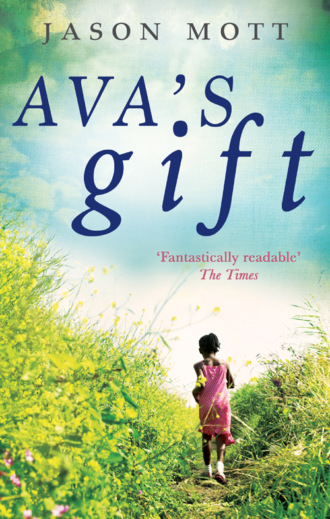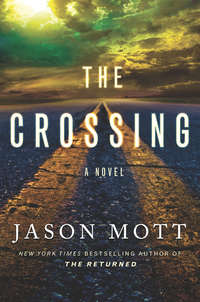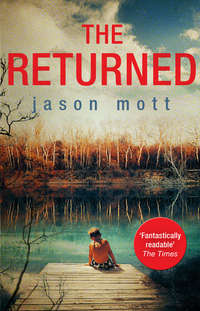
Полная версия
Ava's Gift
Wash let the joke pass. He turned back and forth slightly to be sure that Ava was able to see the full scope of how he was not injured. Not bruised. Not scarred. “You did this,” Wash said. He lowered his shirt and reached for the television remote, then pointed it at the screen that sat high up on the wall above the foot of Ava’s bed.
He flipped through the channels on the television, scanning each one only for a moment. He knew what he was looking for and grew more and more frustrated by the fact that he could not find it. “Just give me a second,” he said. “Don’t go remembering anything just yet. It’ll be so much better if I can just show you. You’re not going to believe it.”
“You’re freaking me out, Wash.”
“Shush!” he interrupted. Finally he stopped changing channels. On the television was a news program with a woman in a well-cut suit standing in front of a large screen with a picture of Ava on it. Across the bottom of the screen was the banner The Miracle Child. For the next few minutes Ava lay back in her hospital bed and watched as video from the Fall Festival filled the screen. She saw Matt Cooper’s airplane rising and falling through the sky. There were images of families and children and people enjoying the booths and rides and the food, and everything seemed perfect and everything was bathed in sunlight.
All of this, Ava could remember.
Then she watched as the airplane rose into the sky—she just could make out the low drone of the plane’s engine over the sound of the oohs and ahhs of the person shooting the video—and then the sound of the engine fell silent.
Then the video broke off and the news anchor returned. She looked into the camera and talked about the potential number of lives that could have been lost, the horror and tragedy that might have been. And then there was a photograph of Ava on the screen. It was taken from her yearbook. Her smile was wide and slightly awkward, like a person who doesn’t like the way their clothes are fitted.
“In a yet unexplained turn of events,” the news anchor continued after explaining how Wash and Ava were trapped beneath the rubble, “this young girl, Ava Campbell, somehow healed her friend of his injuries.” On-screen there was a photo of Wash being pulled from the debris. His clothes were torn and attention was given to the side of his stomach where, only a little while before, there had been a horrible injury. “The boy was utterly and completely healed,” the reporter said again, repeating her words slowly and with faultless elocution.
“Look!” Wash said excitedly, pointing at the television. He looked back at Ava and he lifted his shirt again, as if to verify that what she saw on television and what she saw now, in real life, were both equally true. “You really did that,” he said. “You really did this!” His smile was wide and bright again, filled with wonder and awe.
“It’s not true,” Ava said. She closed her eyes and shook her head. “It’s a joke, right?”
The excitement faded from his face. “Sit up,” he said softly. He lowered his shirt and reached over and put his arms beneath her back to help her sit up in the bed.
“What are you doing?” she asked.
“Just trust me,” he said. He helped her swing her feet over to the side of the bed. She inhaled sharply with each movement. Wash grimaced with her. “This will be quick,” he said. “I promise. You have to see this for yourself.”
The two of them made their way across the room with her arm draped across his shoulders and his arms around her waist. When they reached the window, he helped her sit upon the wide sill. “Where’s my dad?” she asked. “Why isn’t he here?”
“It’s okay,” Wash said. He looked into her eyes. “My guess is that he’s out taking care of what I’m trying to show you.”
“What do you mean?”
“Look,” the boy said, nodding toward the window.
Finally she turned and gazed out the window, which overlooked a parking lot that was crowded with cars and vans and people and banners and cameras. There was cheering and shouting and people waving signs. Along the front of the hospital was a row of policemen, standing in uniform, keeping the crowd from coming inside.
“What’s happening?” Ava asked. “What do they want?”
“You,” the boy said softly. “They’re all here because of you. Can you believe that? You won’t believe how famous Stone Temple is right now—how famous you are right now. People are coming from all over to see you. Hundreds of them—thousands, maybe.”
The crowd below her was like an ocean. There were waves of movement, rivulets of cheering, of signs flagging back and forth.
“It’s just amazing,” Wash said.
“Help me back to bed, Wash,” Ava said. There was the lightning of pain inside her again suddenly, and an emptiness in the pit of her stomach that throbbed like a heartbeat. It made her feel as though the center of her did not exist, as though her body wasn’t completely formed. Then her stomach clenched and there was no more strength in her legs. Wash was not fast enough to catch her as she tumbled to her knees. Ava coughed. It was a hard, rattling cough, and there were flecks of blood on the floor beneath her mouth. More came with each cough.
“Nurse! Nurse!” Wash yelled. “Somebody help!” He struggled to lift Ava from the floor and put her back in the bed. Still he called for help.
“It’s okay,” Ava said as he maneuvered her awkwardly into the bed. She did not see the blood that was in the vomit she left behind on the floor. Only Wash saw that.
“It’s going to be okay,” Wash said softly. In the hallway there was the sound of footsteps approaching.
Ava closed her eyes.
“Before they get here,” Wash said, “I just want to say thank you. Thank you for...well...for whatever happened. For whatever you did.”
“I want to go home,” Ava said. Drowsiness and fatigue was a tide rising inside of her. “When I go home everything will be okay,” she said. In her mind there was the image of her father’s small gray house in Stone Temple. The paint was faded and the wood was worn and broken in places, but home is always a thing of beauty to a child. “I don’t want any of this,” Ava said softly. “I just want to go home.”
“Everything’s different now,” Wash said. “Home isn’t quite home anymore.”
Interlude I
By the time the girl is five years old her mother has found the rhythm of things. The two of them have established a pattern where Ava is never far from her mother’s heels and her mother is always smiling when her daughter comes to be with her. Oftentimes, in the warm hours of the afternoon, when the work is done for the day and her husband is still away at the station, it is possible for them both to believe that they are the only ones left in this world. At these times they will disappear into the mountains for the sake of disappearing.
Heather walks out in front, checking the ground for snakes and pitfalls like a concerned parent, and Ava, for her part, does the job of running up ahead and causing her mother to worry just enough. As Heather walks she thinks about how their lives might change in the years to come. She foresees the day when her daughter will not need her. The day when her child will not be a child but will become a woman who runs ahead into the world and, perhaps, does not look back. What will become of her then?
“Come on, Mom!” Ava calls.
“I’m coming,” Heather replies.
The sun is high and the wind is still and the earth is buzzing with the sound of life. The birds sing. The insects hum.
“Mom?” Ava calls. She has flitted around a bend in the trail, and there is something different in her voice now, as she stands in this place where her mother cannot see her. A knot of fear rises in Heather’s throat.
“What is it?”
“Mom!” Ava screams.
Heather rushes through the brush. It is inescapable, the fear she feels now, the fear she did not know was possible. But she has always been afraid; she simply lacked a location to affix to it. Now she has that: she has a child.
By the time Heather rounds the corner she can hear her daughter crying. It is a wet, choking sound, a soft shudder like the sound of ice breaking. “What is it?” Heather asks, just as she sees that her daughter is unharmed. Sprawled in the thick green grass is a deer. It is a female, its pelt the color of the late evening. There is an arrow rising out of its chest. The animal wheezes, slowly.
“Mom...” Ava says. Her face is streaked with tears. “Mom,” the child repeats. The word is a mantra. Heather looks around, hoping to find the hunter, hoping that things might be brought to a quick and less painful end for the animal. But there is no one. “Is it going to die?” Ava asks.
“It’s not your fault,” Heather replies, though she does not quite know why.
Ava weeps. She tries to understand. “How long is it going to take? What happens after? Is anyone going to bury it?” On and on, she gives voice to the questions that dance in her head.
Her mother does not have the answers. And so the two of them sit in silence, sharing this moment of time, this small plot of a large cruel world, with an animal in its last breaths of life. The deer watches them without fear and it does not flinch, does not withdraw when the child reaches out a trembling hand and places it on the animal’s neck. The deer’s hide is smooth.
Heather kisses the top of Ava’s head. They are both crying now.
The animal’s breathing slows. Without asking, Ava reaches up and grasps the arrow that has pierced the animal’s lung. She pulls it and, after a moment of resistance, it comes free. The deer trembles. It releases a sound like the bleating of sheep. Ava tosses the arrow away.
“Ava,” Heather says, “it’s too late.”
Heather can see in the child’s face that all she wants is for the creature to be better. All she wants is for the blood to stop. All she wants is for death to turn away, just this once. Ava places her hands over the wound. The deer’s blood flows in pulses, like a heartbeat. Ava closes her eyes and wants for nothing other than for the deer to be better.
What comes next is a trembling of her hands, like the spark of electricity placed beneath her palms. Then the deer is up, on its feet. It is still bleeding, but it is able to walk, ever so slowly.
Heather takes Ava in her arms and scuttles backward in the grass. Ava is limp. “Ava!” Heather calls. “Ava!”
Heather watches as the deer walks slowly away—still wheezing, the blood still flowing from its pierced lung, though not as vigorously as it had been. Step after step, the animal disappears into the forest, leaving a trail of blood.
“Ava?” Heather continues, again and again. “Please wake up,” she pleads. The minutes grow into one another like vines until, at last, Ava stirs.
“It’s okay,” Ava says in a voice so low that her mother can barely understand.
Heather weeps with joy at the sound of her daughter’s voice.
“The deer,” Ava whispers. “It’s okay? I wished for it to be okay.”
Heather looks at the trail of blood leading into the forest, but she does not understand anything of what has happened.
Конец ознакомительного фрагмента.
Текст предоставлен ООО «ЛитРес».
Прочитайте эту книгу целиком, купив полную легальную версию на ЛитРес.
Безопасно оплатить книгу можно банковской картой Visa, MasterCard, Maestro, со счета мобильного телефона, с платежного терминала, в салоне МТС или Связной, через PayPal, WebMoney, Яндекс.Деньги, QIWI Кошелек, бонусными картами или другим удобным Вам способом.



